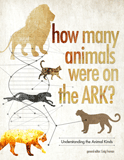Dads on Duty
Fathers in Nature
Many fathers in the animal kingdom get a bad rap for being deadbeat dads. While some animal fathers were created to simply pass on their DNA and then stay away, God created others to go above and beyond to protect and provide for their offspring—no dad jokes here!
Hunting Lessons

A red fox father takes the cake for food duty! For the first several months of fox kits’ lives, a red fox mother (vixen) must stay in the den to feed the kits and keep them warm. A fox father hunts for his mate every four to six hours, and after the kits are weaned, he provides for them, too. When they’re three months old, he stops bringing free meals, compelling his kits to leave the den to search for food themselves. But he doesn’t leave them on their own just yet. Instead, he buries food for them to find, teaching them to hunt and forage.
No Grousing

The phrase water off a duck’s back doesn’t apply to this papa bird. The male sandgrouse has coiled, hair-like extensions called barbules in his feathers that collectively soak up about two tablespoons of water. These specialized feathers are the perfect tool for an important job—satisfying his chicks’ thirst. In their parched desert habitat, these devoted dads sometimes travel up to 20 miles every day to find a watering hole.
Once he’s found water, the sandgrouse fills up by submerging his belly in water, rocking back and forth and shaking his feathers. He then flies back to his chicks, who “milk” his feathers for a drink of water. A sandgrouse dad might make the long commute several times a day for the first 6–8 weeks of his chicks’ lives.
Nature’s Nurturers

Researchers have found that common marmoset babies with faithful fathers have a much higher chance of surviving past 30 days than babies without paternal support. And a common marmoset male takes his duties seriously by helping his mate raise their babies. After his mate gives birth—usually to twins or triplets—the father bites the umbilical cords and cleans up the afterbirth. When the babies are just a few days old, he begins carrying them on his back and does so until they’re strong enough to explore on their own. He passes the babies to their mother only when it’s time to nurse. A dedicated marmoset dad rushes to a baby’s aid when he hears cries of distress.
Fine-Feathered Father

After a female emperor penguin lays her egg, she joins other mothers on a trip to the sea for two months of feeding. Meanwhile, the dads huddle together to keep warm in the Antarctic air. Each dad balances his egg on top of his toes to keep it warm in his brood pouch, a thick flap of skin and feathers on the bottom of his stomach. He doesn’t eat and barely moves for the entire two months because the chick won’t survive if exposed to the cold. If the chick hatches before the mother returns, a papa penguin will feed his chick a milk-like protein produced in his crop. Even after his chick hatches, Dad keeps it in his pouch until the chick is big enough to weather the cold.
Answers Magazine
April–June 2023
Gap theorists insert millions of years between the first two verses of Genesis. But what really lurks in that gap?
Browse Issue SubscribeRecommended Resources

Answers in Genesis is an apologetics ministry, dedicated to helping Christians defend their faith and proclaim the good news of Jesus Christ.
- Customer Service 800.778.3390
- © 2024 Answers in Genesis






